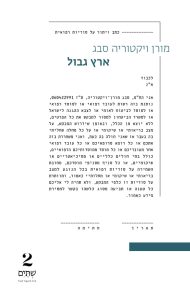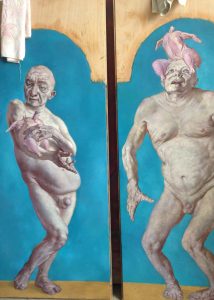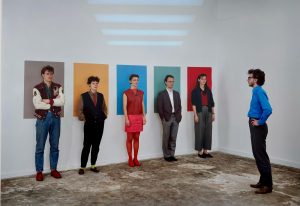For English click here
נונפינטו 2023 תערוכת אמני תוכנית הרזידנסי של ארטפורט, נפתחה בראשית ספטמבר, כחמישה שבועות לפני טבח ה 7 באוקטובר והכאב הבלתי ניתן להכלה שבא בעקבותיו. ההרהורים על כיצד קוראים אמנות, על מה יהיה האופק התרבותי שעליו נביט יהיו עוד רבים. בביקור בשבוע שעבר התחושה הייתה שהאמנות הקדימה, נתנה סימנים במה שעתיד היה להתרחש. קריאה זו, בדיעבד, וודאי טומנת בחובה בעיות ובכל זאת, היום היא בלתי נמנעת.
העבודה של אבנר פינצ’ובר זמן ממ”ד מצמררת באופן בו היא נעה בין מעין ‘שובו של המודחק’ האדריכלי לבין הצגה, מחרידה בקונקרטיות שלה, של פתיחה וסגירה מכנית, לא רצונית (לא אנושית) של חלון ממ”ד. חלון הממ”ד נפתח בקומה שנייה של המבנה, מעל לשביל הכניסה לגלריה. זו קומה שבנייתה מעולם לא הושלמה והיא רק “מסומנת” בחגורת בטון המקיפה אותה. החלונות נפתחם לאט, נדחקים על ידי קופסא גדולה. שני פטישים גדולים, המחוברים לקיר יורדים ומכים בכנפות החלון הנפתחים חלקית וסוגרים אותו. מתבקש לכתוב במקום פטישים, כפי שמופיע בטקסט התערוכה, מקבות, מונח המתאר במקרא פטיש שצידו האחד רחב מהשני והוא מופיע למשל בסיפור של יעל ההורגת את סיסרא (”וַתִּקַּח יָעֵל אֵשֶׁת-חֶבֶר אֶת-יְתַד הָאֹהֶל וַתָּשֶׂם אֶת-הַמַּקֶּבֶת בְּיָדָהּ, וַתָּבוֹא אֵלָיו בַּלָּאט, וַתִּתְקַע אֶת-הַיָּתֵד בְּרַקָּתוֹ, וַתִּצְנַח בָּאָרֶץ; וְהוּא-נִרְדָּם וַיָּעַף, וַיָּמֹת.“ (שופטים ד, פסוק כא). אם בפטיש מהדהדת גם חדוות בניה ועשיה הרי שכאן מהדהדת פאטליות.
לעבודה הוצמד טקסט המתייחס לשינוי הקריאה, הבלתי נמנע, ולהחלטה שלא להפעילה. ולצופים ניתן QR לצפייה בעבודה. העבודה הופעלה עבורי בביקור בשעות הערב. התאורה הכחלחלה הקורנת מתוכה חזקה וכך צליל מכות המקבות רם במיוחד ברחוב הדומם. חלון ממ”ד היה מאז ומעולם, כלומר גם לפני ה 7 באוקטובר, דימוי המסמן סכנה אך היום הוא מפעיל שרשת אסוציאציות מחרידות.
ביחס לעבודות קודמות של פינצובר “זמן ממ”ד” הנוגעת באפלה, מאופקת, ולולא המשמעויות שנטענה בהן בהווה הייתי אומרת בעלת איכות קולנועית, מימטית ביחס למציאות, לעומת יצירות קודמות שלו כמו עבודה מרשימה ואלימה של ניפוץ כסאות אותה הציג בסיום לימודיו במדרשה ביקורת בוגרי המדרשה 2018 – החלון או עבודות שהציג בביאנלה לרישום ב 2019 ביקורת הביאנלה לרישום 2019 – החלון .

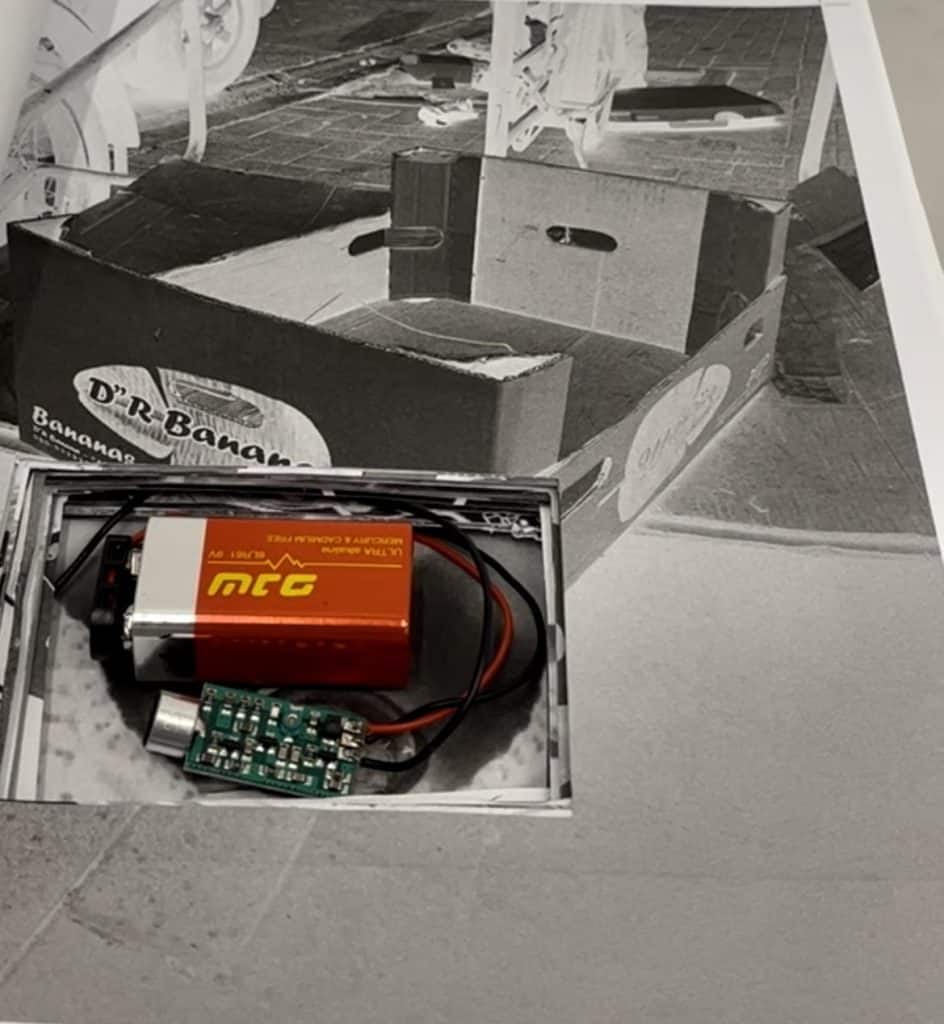
הטקסט שכתבה לעבודה ורדית גרוס אוצרת התערוכה, במקור, כלומר לפני שהמציאות התערבה בקריאה, בעיתי : הוא מגשש אחר פרשנות אופטימית לאלימות שהעבודות של פינצובר רוויה בהן, מרמז לאלימות כסוג של אורגזמה, ומזכיר את התמימות/יהירות של פוטוריזם איטלקי משנות העשרה של המאה הקודמת שהילל את יפי האלימות. “הוא זורק כיסאות על קיר, אבן על זכוכית, יורה נורות פלורסנט על קווי מתח גבוה, דוחק את חלונות הממ”ד בקומה שלא נבנתה, מרסק את גופו כנגד קיר גבס. רגע המגע הוא רגע ההתפוצצות, ורגע ההתפוצצות הוא רגע של התענגות ושל שינוי – מעבר מאנרגיה אחת לאחרת, מחום לאור, מתנועה לשבר”. דומה ש “התפוצצות” ו”התענגות” לא מתיישבות היום באותו המשפט.
תחושת החמצה מסוימת מלווה את העבודות בחלל הגלריה (“זמן ממ”ד” ממוקמת כאמור על קיר חיצוני). האמניות והאמנים טובים והדבר ניכר, אך העבודות הצבות ברובן אינן הטובות ביותר שלהם. לאחרונה הציגה אירה אדוארדובנה שתי תערוכות מצוינות: ב מוזיאון תל אביב את מיצב הוידאו דרך הברזל (2021) בו חזרה אל הלילה שבו עזבה עם משפחתה את אוזבקיסטן בדרך לישראל, ובגלריה שלוש הציגה את רישומי ספר הנושא את אותו השם “דרך הברזל” ומשלו בין ספר אמנית ונובלה גרפית אוטוביוגרפית. כאן היא עוסקת באחת ההתרחשויות שהיו קשורות להגירה, רכישת הדפסים של גורי פוליפוביץ”. צייר סובייטי ורובה ציד עתיק אותם יכלו הוריה הביא לארץ מתוך כוונה שמכירתם תספק יציבות כלכלית מסוימת למשפחה. הם לא נמכרו ואדוארדובנה מתבוננת בהם מחדש כמסמנים את הפער התרבותי העצום בין מה שהכירו הוריה, מה שציפו לו, ומה שהתרחש.

העבודות של הלל רומן ועבודות הווידיאו של יעל אפרתי מסקרנות ומבטיחות. המיצב של לי נבו נדמה כאילו צומצם להתאים לחלל ואולי יתפתח בהצבה נרחבת יותר. המיצב של חן כהן מאכזב. כהן היא אמנית בעלת קול מובחן – הדבר בלט בתערוכת היחידה המצוינת “איך למות יפה” ב 2021 החלון – איך למות יפה . הפעם, העבודות בעיקר מזכירות עבודות אחרות: כך למשל פסל דמוי כד לבן שניצב על שולחן אלגנטי ומאחוריו, צילום אותו הפסל בשחור, ספק צל – ספק השתקפות, נראה כמו מפגש השפעות של רמי מימון ודוד עדיקא, אובייקט מוזהב, כנראה יציקת איבר גוף מנצנץ בזהב ג’יימס לי ביירס. הקו הברור שאפיין את התערוכה ב 2021 נעלם לטובת גישוש- חיפוש שמרני למדי.
אוצרת ורדית גרוס
העמל 8, תל אביב

NonFinito 2023
Artport’s artists-in-residence group exhibition opened in early September, about five weeks before the October 7th massacre with its indelible pain. The way we read art has changed, as has the cultural horizon. On my visit to the exhibition last week, it seemed that many works were omens of what was to come. This retrospective reading, also problematic, was nevertheless unavoidable.
Avner Pinchover’s Protective Space Time is chilling in the way it moves between a kind of architectural “return of the repressed” and an unfolding drama of mechanical, involuntary (non-human) opening and shutting of a safety window of a protective space which is chilling in its concreteness. The window opens on the unfinished second story of the building, above the way leading to the Gallery. Construction was never completed, only indicated by a belt of encompassing concrete. The windows open slowly, pressed by a large box. Two large mallets connected to the wall, descend and bang the wings that are partially open, shutting them. Instead of the word “hammers” that appears on the gallery text, I feel the correct word is mallets, such as in the Biblical story of Jael who kills Sisera by driving a tent-peg into his temple with a mallet (Judges 4:21). “Hammer” evokes the joy of construction and of making, while here it is a matter of fatality.

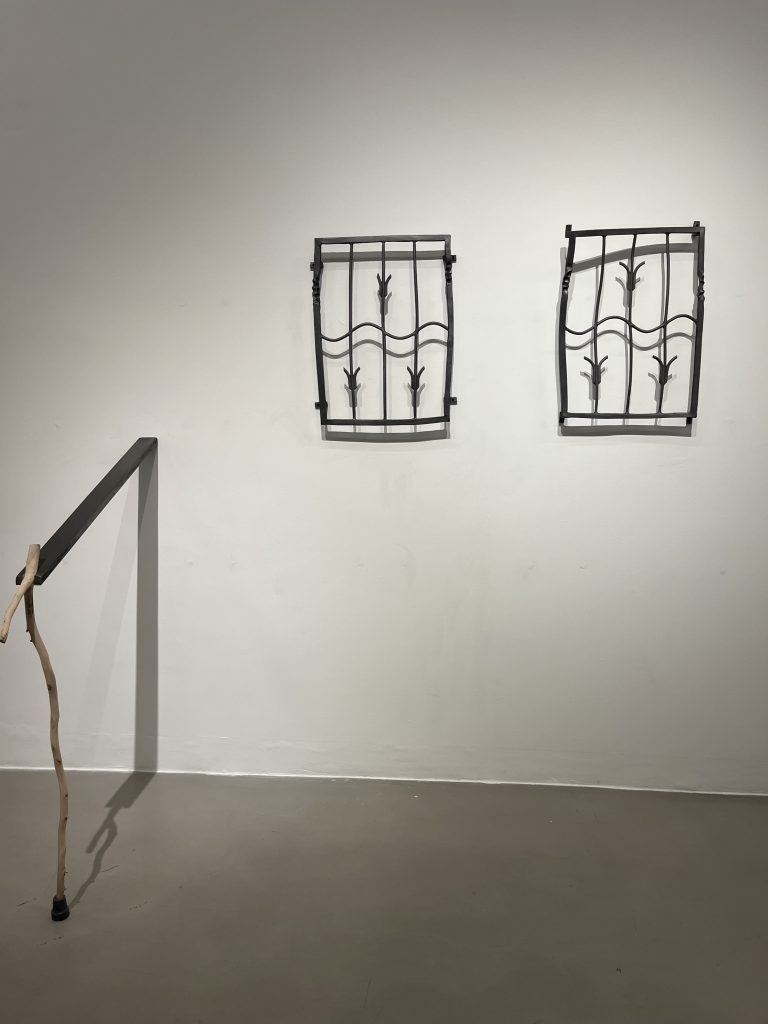
The accompanying text refers to the inevitable shift in reading the work and the decision not to operate it. Viewers have a QR code to scan to watch the installation, which was operated for me during an evening visit. The bluish light emanating from it is strong, as is the sound of the banging mallets, especially in the silent street. The window of the protective space has always been an image symbolizing danger – even before October 7th – but now it generates a chain of horrific associations.
In relation to Pinchover’s previous works, Protective Space Time is a restrained work that touches upon the darkness, and were it not for the present charged meanings in it, I would say it has cinematic quality with a mimetic reference to reality, as compared to the earlier ones. In an impressive video, shown as his graduation project at the Midrasha 2028 – The Window chairs were violently and repetitively shattered,or his video exhibited in the 2019 Biennale of Drawing, Jerusalem – The Window .
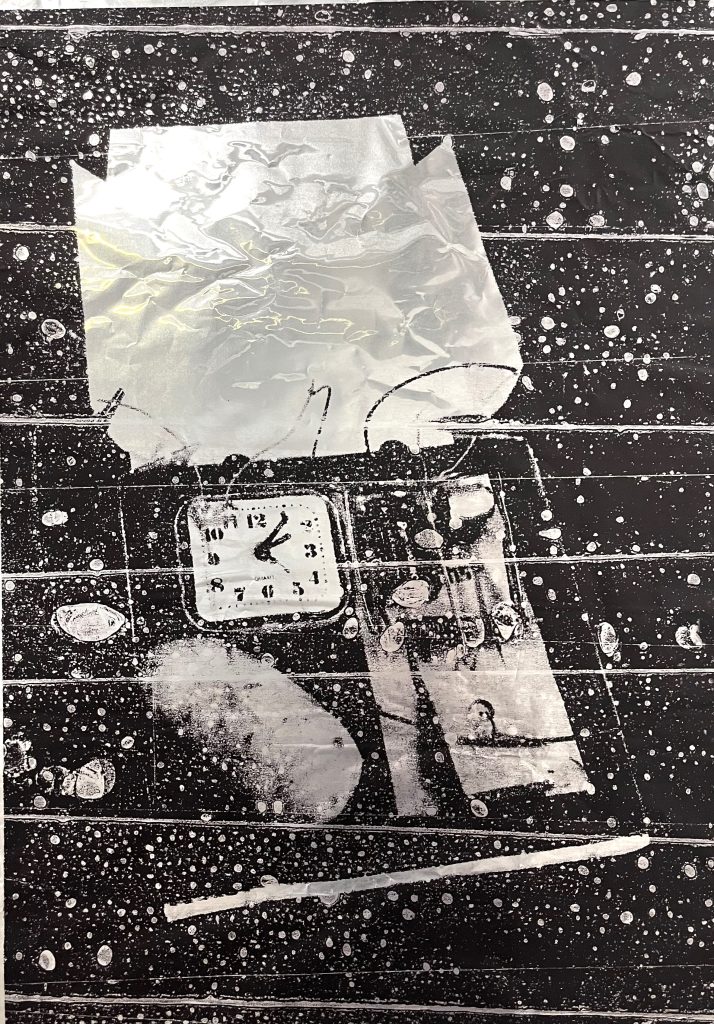
The original text on the work by Curator Vardit Gross, before current events derailed the reading of the work, is problematic. It attempts a search for an optimistic interpretation of the violence suffusing Pinchover’s oeuvre. It suggests violence as a kind of orgasmic release, reminiscent of the innocent hubris of the Italian Futurists of the early 20th century who praised the beauty of violence. “Avner Pinchover seeks to convert one form of energy to another, to breach physical and mental boundaries. He throws chairs against a wall, a stone against glass, shoots fluorescent lights at high voltage power lines, pushes the metal shutters of the security room in an unfinished floor, crashes his own body against a plaster wall. The moment of contact is the moment of explosion, and the moment of explosion is a moment of pleasure and transition—from one type of energy to a different one, from heat to light, from motion to fracture.” It seems that “explosion” and “pleasure” do not belong in the same sentence.
The installation inside the gallery space leaves much to be desired. (Protective Space Time is installed on an external wall and not inside the space). The artists are good, but the works on view are not their best. Ira Eduardovna has recently shown two excellent exhibitions at the Tel Aviv Museum of Art, and at Chelouche Galley. The video Iron Road (2021) at the Museum is a reenactment of the night night her family left Uzbekistan for Israel, while the Gallery exhibited her drawings of the graphic novel bearing the same name. Here she engages in one of the events associated with her emigration: her parents purchased prints by Soviet Artist Gyuri Polipovitch and an antique hunting rifle which her parents intended to sell in Israel to support themselves. They were never sold; they are signifiers of the huge cultural gap between what was familiar to her parents, what they expected and what happened after their immigration.

Hillel Roman’s works and Yael Efrati’s videos are intriguing and promising. Lee Nevo’s installation seems to have been minimized to suit the site, but will perhaps develop in a broader installation. Chen Cohen has a distinctive voice which stood out in her excellent solo exhibition “How to die beautiful” (2021) but here her works are quite disappointing How to die beautiful 2021 – The Window . They are too reminiscent of works by others; for example, the white sculpture of a vase placed on an elegant table with a photograph of the same sculpture in black behind it, as a shadow or reflection. This seems like influences from Rami Maymon and David Adika, while a golden object looking like a cast body part glistens like a James Lee Byars sculpture. The clear line characterizing her 2021 exhibition has faded in this overly conservative search.
Curator: Vardit Gross
Artport, 8 Ha’amal Street, Tel Aviv. Through December 16, 2023.
Photographs: Smadar Sheffi
Translation: J. Appleton



